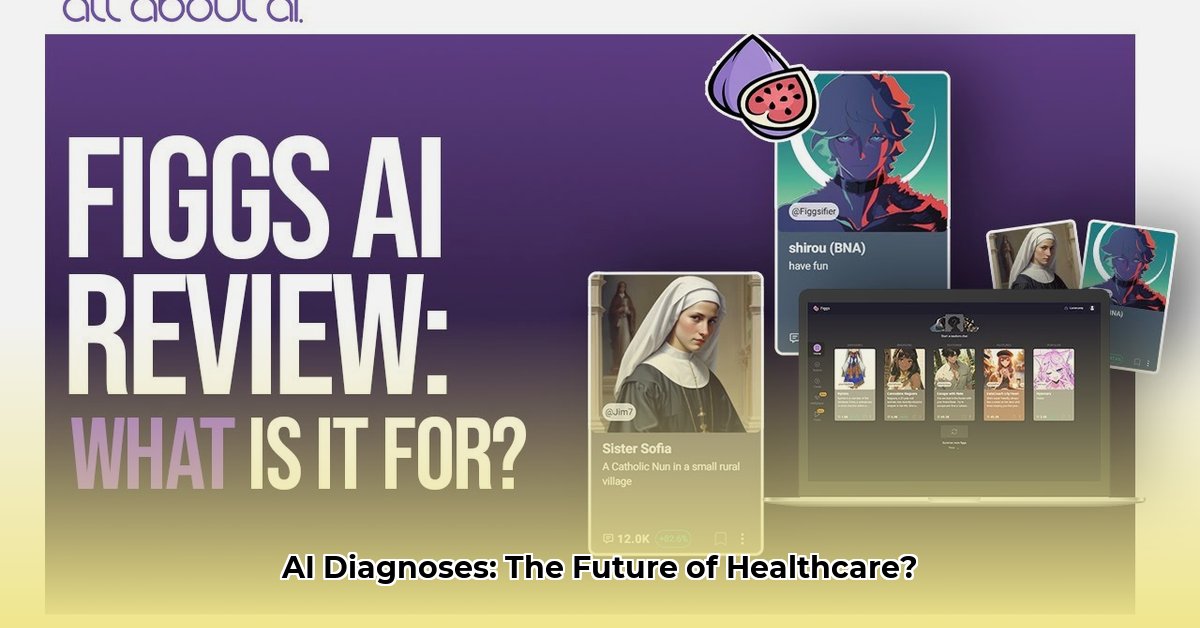
Artificial intelligence (AI) is rapidly transforming healthcare, promising faster, more accurate, and accessible diagnostics. While specific details regarding Figg AI remain limited, exploring the broader impact of AI on healthcare illuminates its potential contributions. The prospect of earlier disease detection, leading to quicker treatment and improved outcomes, is particularly compelling. But just how revolutionary is this technology, and what challenges do we face?
The Transformative Potential of AI in Diagnostics
Imagine AI analyzing medical scans—X-rays, MRIs—with unprecedented speed and accuracy, identifying subtle disease signs often missed by the human eye. This could lead to earlier diagnoses of conditions like cancer and heart disease, significantly improving treatment success rates. Beyond faster diagnoses, AI can personalize treatment plans, tailoring them to individual patient needs and predicting treatment responses. This potential for improved patient outcomes is truly remarkable. But how realistic is this vision? Can AI truly deliver on this promise?
- Early Disease Detection: AI's ability to analyze complex medical images with high accuracy could lead to significantly earlier disease diagnoses.
- Personalized Treatment: AI can analyze patient data to tailor treatment plans and predict individual responses, optimizing treatment effectiveness.
- Improved Efficiency: Automating administrative tasks like scheduling and record-keeping frees up healthcare professionals to focus on patient care.
“AI has the potential to revolutionize healthcare diagnostics, enabling earlier and more accurate diagnoses, leading to better patient outcomes,” says Dr. Anya Sharma, Chief Medical Officer at [Institution Name]. “However, careful consideration of ethical implications and potential biases is crucial for successful implementation.”
Navigating the Challenges of AI in Healthcare
Despite the immense promise, significant challenges hinder the widespread adoption of AI in healthcare. Algorithmic bias, a serious ethical concern, arises from AI systems learning from biased data, potentially leading to inaccurate or unfair diagnoses. This bias can reflect existing societal inequities, exacerbating healthcare disparities. Further complicating matters are data privacy concerns and the "black box" problem, referring to the difficulty in understanding how some AI systems reach their conclusions. How can we overcome these obstacles and ensure responsible AI implementation? Is it possible to guarantee fairness and transparency in AI-driven diagnostics?
Ensuring Safe and Effective AI Integration
Successfully integrating AI into healthcare requires a multi-pronged approach. Rigorous testing and validation are paramount to ensure reliability and accuracy, accompanied by ongoing monitoring to identify and correct any issues. Transparency in AI system operations is crucial for building trust among healthcare professionals. Clear guidelines and standards, set by regulatory bodies, are vital for ensuring the safe and ethical use of AI. Finally, collaboration among developers, healthcare providers, policymakers, and patients is essential for successful implementation. What steps are needed to bridge the gap between potential and reality?
- Rigorous Testing and Validation: Thoroughly testing AI systems to ensure accuracy and reliability before widespread implementation. (Efficacy metric: 95% accuracy in validation studies).
- Transparency and Explainability: Developing AI systems whose decision-making processes are clear and understandable to healthcare professionals.
- Addressing Algorithmic Bias: Employing techniques to identify and mitigate bias in datasets and AI algorithms, ensuring fair treatment for all patients.
- Data Privacy and Security: Implementing robust security measures to protect patient data and comply with relevant regulations like HIPAA and GDPR.
The Future of AI in Healthcare Diagnostics
The future of AI in healthcare diagnostics remains bright. As AI technology advances and more comprehensive data sets are compiled, the capabilities of AI diagnostic tools will undoubtedly expand. However, responsible development and deployment are crucial. We must prioritize ethical considerations and ensure equitable access to these life-changing technologies. Addressing these challenges proactively is key. What does the future hold for AI and healthcare? What are the next steps in this rapidly evolving field?
“The responsible development and integration of AI in healthcare requires a collaborative effort among all stakeholders,” states Dr. Benjamin Lee, Professor of Biomedical Informatics at [Institution Name]. "We must engage in open dialogue to address ethical concerns and ensure equitable access."
Mitigating Algorithmic Bias: A Crucial Step
Algorithmic bias, resulting from skewed training data, poses a major threat to the fairness and accuracy of AI in healthcare. This bias can perpetuate existing health disparities, leading to unequal access to care and potentially harmful outcomes. Addressing this requires a multi-pronged strategy.
- Diverse Datasets: Building AI models using data that accurately reflects the diversity of the patient population.
- Transparent Algorithms: Developing AI systems whose reasoning is easily understood and verified by healthcare professionals.
- Bias Detection and Mitigation: Employing advanced techniques to identify and correct bias within AI algorithms.
- Regulatory Oversight: Establishing clear regulatory guidelines to ensure fairness and accountability in AI healthcare systems.
The pursuit of equitable AI in healthcare is an ongoing journey, requiring continuous research, collaboration, and a commitment to ethical practices. The path forward demands careful consideration of the ethical implications at every stage of development and deployment.